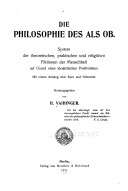The Philosophy of 'As if'
 Title page of the German edition | |
| Author | Hans Vaihinger |
|---|---|
| Original title | Die Philosophie des Als Ob |
| Country | Germany |
| Language | German |
| Subjects | Epistemology, Immanuel Kant |
| Published |
|
| Media type | Print (Hardcover and Paperback) |
| Pages | 368 (1968 Routledge edition) |
| ISBN | 978-1508663751 |
The Philosophy of 'As if': A System of the Theoretical, Practical and Religious Fictions of Mankind (German: Die Philosophie des Als Ob) is a 1911 book by the German philosopher Hans Vaihinger, based on his dissertation of 1877.[1] The work for which Vaihinger is best known, it was published in an English translation by C. K. Ogden in 1924.[2] In 1935, a revised and abbreviated English translation by Ogden was published. The revised translation was based on the sixth German edition of the original work.[3]
Summary
Vaihinger, based on his study of Immanuel Kant and Friedrich Nietzsche, argues that while sensations and feelings are real, the rest of human knowledge consists of "fictions" that can only be justified pragmatically. In his view, even the laws of logic are fictions, albeit fictions that have proved their indispensable worth in experience and are thus held to be undeniably true. Vaihinger believes that it is not worth asking whether ethical, religious and metaphysical doctrines are true in an objective sense, since this cannot be discovered, but that one should ask whether it is useful or even necessary to act 'as if' they were true. (For example, according to Kantian ethics, we must act 'as if' moral laws were laws of nature because of our non-physical consciences.) He concedes that the concepts of fiction and 'as if' vary depending on the type of truth concerned, which may be logical, scientific, religious, or something else.[4]
Reception
The Philosophy of 'As if' influenced both Sigmund Freud since his 1913 letter to Sándor Ferenczi,[5] and Alfred Adler in his 1912 book Über den nervösen Charakter. Grundzüge einer vergleichenden Individualpsychologie und Psychotherapie (English translation: The Neurotic Constitution. Outlines of a Comparative Individualistic Psychology and Psychotherapy).[6][7] Though it contained the first use of the term "logical positivism", the logical positivists were generally dismissive of the work.[1] The philosopher Moritz Schlick wrote that Vaihinger's description of his philosophy as a form of "idealist positivism" was one of its many contradictions.[8]
The American journalist H. L. Mencken was scathing in his criticism of the book, which he dismissed as an unimportant "foot-note to all existing systems".[9] Michael J. Inwood writes that Vaihinger's theory "involves familiar, though not necessarily insurmountable, difficulties". He finds it open to criticism on the grounds that it involves a covert appeal to a non-pragmatic concept of truth. He also notes that the theory implies that claims about the utility of holding doctrines and even the theory itself are no more than useful fictions.[4]
See also
References
- 1 2 Fine, A. (1993). Fictionalism. Midwest Studies in Philosophy 18 (1):1-18.
- ↑ Kuehn, Manfred (1999). Audi, Robert, ed. The Cambridge Dictionary of Philosophy. Cambridge: Cambridge University Press. p. 947. ISBN 0-521-63722-8.
- ↑ Ogden, C. K.; Vaihinger, Hans (1968). The Philosophy of 'As if'. London: Routledge. p. v.
- 1 2 Inwood, M. J. (2005). Honderich, Ted, ed. The Oxford Companion to Philosophy. Oxford: Oxford University Press. p. 941. ISBN 0-19926479-1.
- ↑ Freud, Sigmund; Ferenczi, Sándor; Brabant, Eva (1993). Brabant, Eva; Falzeder, Ernst; Giampieri-Deutsch, Patrizia, eds. The Correspondence of Sigmund Freud and Sándor Ferenczi. Volume 1, 1908-1914. Harvard University Press. p. 498. ISBN 978-0-674-17418-4.
- ↑ Adler, Alfred (2013) [1912]. The Neurotic Constitution. Outlines of a Comparative Individualistic Psychology and Psychotherapy. Abingdon-on-Thames: Routledge. p. passim. ISBN 978-1-136-33037-7.
- ↑ Szasz, Thomas S. (1977). The Myth of Mental Illness. Frogmore: Paladin Books. p. 225.
- ↑ Schlick, Moritz (1981). Hanfling, Oswald, ed. Essential Readings in Logical Positivism. Oxford: Basil Blackwell. p. 87. ISBN 0-63112566-3.
- ↑ Mencken, H. L. (1924) Philosophers as Liars. The American Mercury, October, Vol III, No.10, pp. 253-255.
External links
- Die Philosophie des Als Ob 7th, 8th ed. in German (1922), at archive.org